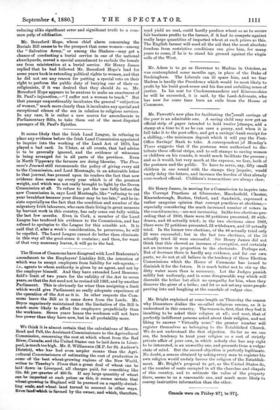Mr. Beresford , Hope, whose chief alarm concerning the Burials Bill
seems to be the prospect that some women—among the " Salvation Army," or among the Shakers—may get a chance of conducting a burial service in one of the national churchyards, moved a special amendment to exclude the female -sex from ministration at a. burial service. Sir Henry James replied that he had followed Mr. Beresford Hope's lead for some years back in extending political rights to women, and that he did not see any reason for putting a special veto on their right to perform the public duty of burying one of their co- religionists, if it was desired that they should do so. Mr. Beresford Hope appears to be anxious to make an enactment of St. Paul's injunction,—" I suffer not a woman to teach." But that passage unquestionably inculcates the general " subjection -of women," much more clearly than it inculcates any special and exceptional silence of the sex in relation to religious services. In any case, it is rather a new source for amendments to Parliamentary Bills, to take them out of the most disputed passages of St. Paul's Epistles.


































 Previous page
Previous page